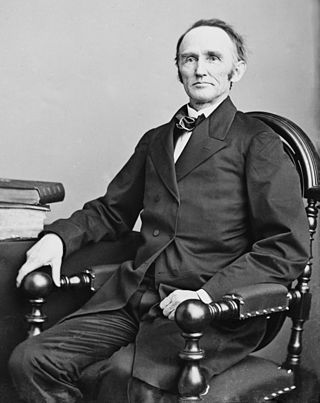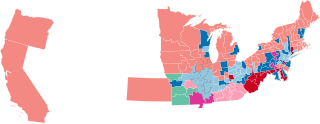
Montgomery Blair was an American politician and lawyer from Maryland. He served in the Lincoln administration cabinet as Postmaster-General from 1861 to 1864, during the Civil War. He was the son of Francis Preston Blair, elder brother of Francis Preston Blair Jr. and cousin of B. Gratz Brown.

The 1952 United States Senate elections was an election for the United States Senate which coincided with the election of Dwight D. Eisenhower to the presidency by a large margin. The 32 Senate seats of Class 1 were contested in regular elections, and three special elections were held to fill vacancies. The Republicans took control of the Senate by managing to make a net gain of two seats. However, Wayne Morse (R-OR) became an independent forcing Republicans to rely on Vice President Richard Nixon's tie-breaking vote, although Republicans maintained a 48–47–1 plurality. Wayne Morse would caucus with the Republicans at the start of Congress’ second session on January 6, 1954 to allow the GOP to remain in control of the Senate. This was the third time, as well as second consecutive, in which a sitting Senate leader lost his seat.

The 1862–63 United States House of Representatives elections were held on various dates in various states between June 2, 1862, and November 3, 1863, during the American Civil War and President Abraham Lincoln's first term. Each state set its own date for its elections to the House of Representatives before the first session of the 38th United States Congress convened on December 7, 1863. The congressional reapportionment based on the 1860 United States census was performed assuming the seceded states were still in the union, increasing the number of congressional districts to 241. West Virginia was given three seats from Virginia after the former broke away from the latter to rejoin the union as a separate state. The seceded states remained unrepresented and left 58 vacancies. Republicans lost 22 seats and the majority, while Democrats gained 28.

Joseph Draper Sayers was the 22nd governor of Texas from 1899 to 1903. During Sayers's term, the Galveston Hurricane of 1900 demolished that city.

The 1912–13 United States Senate elections were held on various dates in various states. They were the last U.S. Senate elections before the ratification of the Seventeenth Amendment in 1913, establishing direct elections for all Senate seats. Senators had been primarily chosen by state legislatures. Senators were elected over a wide range of time throughout 1912 and 1913, and a seat may have been filled months late or remained vacant due to legislative deadlock. Some states elected their senators directly even before passage of Seventeenth Amendment. Oregon pioneered direct election and experimented with different measures over several years until it succeeded in 1907. Soon after, Nebraska followed suit and laid the foundation for other states to adopt measures reflecting the people's will. By 1912, as many as 29 states elected senators either as nominees of their party's primary or in conjunction with a general election.

Byron Gray Stout was a politician from the U.S. state of Michigan.

The 1862–63 United States Senate elections were held on various dates in various states, occurring during the American Civil War. As these U.S. Senate elections were prior to the ratification of the Seventeenth Amendment in 1913, senators were chosen by state legislatures. Senators were elected over a wide range of time throughout 1862 and 1863, and a seat may have been filled months late or remained vacant due to legislative deadlock. In these elections, terms were up for the senators in Class 1.

The 1870–71 United States House of Representatives elections were held on various dates in various states between June 6, 1870, and October 6, 1871. Each state set its own date for its elections to the House of Representatives before or after the first session of the 42nd United States Congress convened on March 4, 1871. They occurred in the middle of President Ulysses S. Grant's first term. Elections were held for all 243 seats, representing 37 states.

The 1916 United States Senate election in Maryland was held on November 7, 1916.

The 1916 United States Senate election in Texas was held on November 7, 1916. Incumbent Democratic U.S. Senator Charles Culberson was re-elected to a fourth term in office. Culberson survived a challenge from former Governor Oscar Colquitt in the Democratic primary, then easily won the general election. He was challenged by Republican Alex W. Atcheson and Socialist Thomas Hickey, publisher of The Rebel.

The 1944 United States Senate election in California was held on November 7, 1944.

The 1946 United States Senate election in Tennessee was held on November 5, 1946. Incumbent Democratic Senator Kenneth D. McKellar was re-elected to a sixth term in office. He defeated a primary challenge by Edward W. Carmack Jr. and easily won the general election against Republican William B. Ladd, and Independent candidate John Randolph Neal Jr.

The 1954 United States Senate election in Michigan was held on November 2, 1954. Incumbent Republican U.S. Senator Homer S. Ferguson ran for re-election to a third term, but was defeated by the Democratic Detroit Board of Education member Patrick V. McNamara.

The 1956 United States Senate special election in West Virginia took place on November 6, 1956, to elect a U.S. Senator to complete the unexpired term of Senator Harley M. Kilgore, who died on February 28. 1956. State Tax Commissioner William Laird III was appointed to fill this seat by Governor William C. Marland to fill the vacancy until a special election could be held and assumed office on March 13, 1956.

The 1860 Michigan gubernatorial election was held on November 6, 1860. Republican nominee Austin Blair defeated Democratic nominee John S. Barry with 56.69% of the vote.

The 1872 Michigan gubernatorial election was held on November 5, 1872. Republican nominee John J. Bagley defeated Democratic nominee William Montague Ferry Jr. with 61.93% of the vote.

The 1994 Michigan Secretary of State election was held on November 8, 1994. Republican nominee Candice Miller defeated incumbent Democrat Richard H. Austin with 53.56% of the vote, amidst a national Republican landslide.

The 1932 Wisconsin gubernatorial election was held on November 8, 1932. Incumbent Republican Governor Philip La Follette was defeated in the Republican primary, and in the midst of the Great Depression and nationwide voter dissatisfaction with the Republican Party, Democratic nominee Albert G. Schmedeman defeated Republican nominee Walter J. Kohler Sr. and Socialist nominee Frank Metcalfe with 52.48% of the vote. Schmedeman became the first Democrat to win a gubernatorial election in Wisconsin since George Wilbur Peck in 1892. Two years later, in 1934, La Follette would run for governor again and defeated Schmedeman, this time running with the Progressive Party.

The 1862 Massachusetts gubernatorial election was held on November 4.

The 2022 Texas lieutenant gubernatorial election was held on November 8, 2022, to elect the lieutenant governor of the state of Texas. The election coincided with various other federal and state elections, including for governor of Texas. Primary elections were held on March 1, with runoffs being held on May 24 for instances in which no candidate received a majority of the initial vote. Texas is one of 21 states that elects its lieutenant governor separately from its governor.























